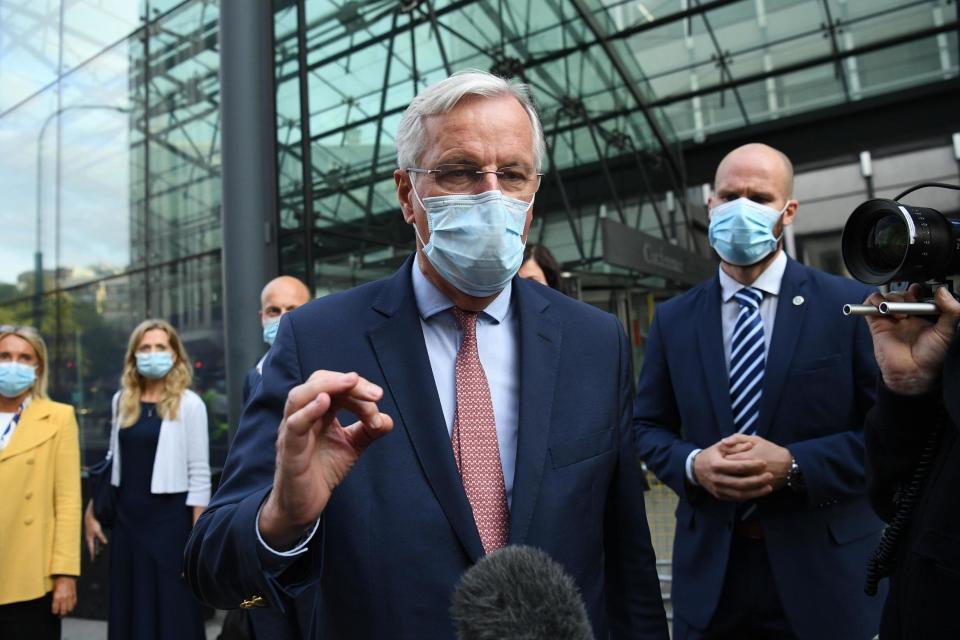Boris Johnson warned that 'silent loyalists' prepared to block Government's bid to override Brexit treaty

Boris Johnson was today warned that “silent loyalists” in the House of Lords are preparing to block his Bill that seeks to over-ride the Brexit treaty he signed with the EU.
Ex-premier Gordon Brown became the latest political grandee to speak out, warning that No10’s tactics risked leaving the UK “in a battle with Europe for years ahead” when it should be focusing on repairing the economy.
While Mr Brown’s outrage did not trouble Downing Street, it could not ignore former Conservative leader Lord Howard, who this morning said he would be “very surprised” if Mr Johnson’s Bill got through the Lords.
The Bill has been roundly condemned by the EU which last night threatened to call off talks on a free trade deal unless it was withdrawn by the end of the month.
It now faces rebellions in both Houses, with Sir Bob Neill, the chairman of the Justice Select Committee, leading an amendment that would give Parliament a veto over future attempts by the Government to disregard or overturn parts of the Withdrawal Agreement (WA), the deal that Mr Johnson signed in January that set rules for Britain’s departure from the EU.
Tory whips were arguing that Sir Bob’s amendment was flawed and would not have the effect the rebels wanted. With a Government majority of 80, it would take 40 rebels for the Bill to be changed in the Commons.
The focus was turning to the Lords where a series of grandees, including Brexiteers like Lord Howard and ex-chancellor Lord Lamont, have savaged the Bill. One peer said: “My impression is that silent loyalists who never usually rebel are quietly planning to make a stand on this one, which means it must be in danger.”
The Internal Market Bill was published on Wednesday in what many MPs saw as a provocative act during fragile trade talks with the EU.

According to the Government, its purpose is to maintain smooth trade between England, Scotland, Wales and Northern Ireland after the UK leaves the EU rules on December 31.
However, the real purpose, MPs believe, is to wriggle out of the Prime Minister’s promise to maintain at all costs an open border between Northern Ireland and Ireland, a concession that Mr Johnson may regret because it reduced his leverage in the talks.
Lord Howard told Sky News: “I think this makes a no-deal more likely.” Former Tory leaders Sir John Major and Theresa May have also attacked the Bill.
Mr Brown told Good Morning Britain he feared long-term consequences. “My fear is not just a no-deal; my fear is we’ll have such a minimal deal that we’ll be in battle with Europe for years ahead and that really does not make sense if we want people to have jobs in our economy.”
Business minister Nadim Zahawi claimed in interviews that the Bill was necessary to prevent “harms” being inflicted on the UK. The Standard invited his department to explain what they were. He denied reneging on the WA. “The Withdrawal Agreement and the Northern Ireland protocol we are absolutely committed to,” he asserted on BBC Breakfast. “It’s not about ‘if’ we implement the Withdrawal Agreement and the Northern Irish protocol, it’s ‘how’ we implement it.”
The row overshadowed the first signing of a major post-Brexit trade deal this morning — an agreement with Japan worth £15 billion.
International Trade Secretary Liz Truss said it was a “historic moment” that not only preserved current trade but added protection for music from piracy and more access for the City in Tokyo. The value is worth around 0.07 per cent of GDP.
Read more
Cabinet 'at war' over new rule of six as Brits race home- LIVE

 Yahoo News
Yahoo News 